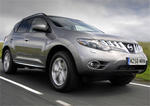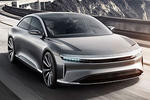
Nissan announced its participation in the Tokachi E10 project and the beginning of their bio-ethanol trials. Nissan will test the feasibility of E10 fuel (contains 10% bio-ethanol mix) with the help of their Nissan Murano E10. The Nissan Murano E10 is Japan's first Ministry-authorised E10 vehicle.
Nissan Press Release:
Nissan Motor Co., Ltd today announced that it will begin bio-ethanol trials through its participation in the Tokachi E10 project. The project, the first of its kind in Japan, aims to test the feasibility of E10 fuel, which contains 10% bio-ethanol mix. Early trials will be conducted in the Tokachi region of Hokkaido, beginning April 1.
Nissan is the first automaker in Japan to come forward with an E10 vehicle fully compliant with the safety, environment and technical guidelines issued by the Ministry of Land, Infrastructure and Transport. The Murano E-10 is officially recognised as Japan's first Ministry-authorised E10 vehicle.
Within the scope of the Tokachi project, Nissan will support research related to the E10 engine’s combustion efficiency and exhaust emissions. Vehicle performance data collected will further the
development of E10 bio-ethanol powertrains and allow the engineers to identify key areas for improvement, in order to accelerate the commercialisation of bio-fuels and E10 vehicles in the marketplace.
Tokachi Zaidan2 is the recipient of a technology grant by the Ministry of Environment, aimed at addressing issues related to global warming and fossil fuel dependence, via the promotion of bio-fuels as an alternative energy source.
The Tokachi project uses substandard wheat and sugar beet to produce bio-ethanol, which helps
minimise impact on food supplies. The project has the capacity to produce 15,000 kilo-litres of bio-ethanol to substitute up to one percent of the gasoline consumption in Hokkaido per annum.
Bio-ethanol is considered a renewable energy source because it is derived from plants such as sugar-cane or soybean, and thus does not add to the net CO2 level in the atmosphere3, as opposed to fossil fuel. In the U.S. and Brazil, bio-ethanol has been commercialised for many years and is gaining wider acceptance worldwide.
Nissan has been offering the E85-compatible Titan full-size pickup and Armada SUV in the U.S.4, and continues to develop and promote bio-fuel technology globally.
Its participation in the Tokachi project is in line with its Nissan Green Program 2010 mid-term environmental plan, aimed at developing new technologies, products and services that can lead to real-world reductions in vehicle CO2 emissions, cleaner emissions, and recycling of resources.
The project has been implemented from July 2, 2007 and will continue on until Mar 31, 2009. The on-road test will be conducted between April 1 and Dec 19, 2008.
23-9, Nishi 22-jo Kita 2-chome, Obihiro, Hokkaido 080-2462
This is based on the "carbon neutral" concept. Plants capture CO2 through photosynthesis, hence the CO2 released by plant-based fuel will not add to the net CO2 level in the atmosphere.
Titan has been sold since model year 2005 and Armada since model year 2007.










